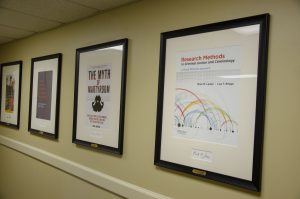 We have a wide range of exciting interdisciplinary interests, but our areas of focus in Criminology and Criminal Justice include:
We have a wide range of exciting interdisciplinary interests, but our areas of focus in Criminology and Criminal Justice include:
- Violent Crime
- Courts and Corrections
- Global Criminology
The page provides brief overviews of our faculty members’ research interests in these areas. For more detailed information, browse our directory.
Violent Crime
Dr. Michael Barton‘s research interests are in the areas of criminology, urban sociology, and neighborhood correlates of crime. Topics explored in his research include crime in the context of college campuses and high schools, the importance of deportations on violent crime, and the association of gentrification with violent crime (including gang and non-gang homicide) and school-level academic performance.
Dr. Susan Dewey’s research revolves around violence as a social problem: how socio-structural forces inform and create violence, how individuals cultivate resilience after violent experiences, and how institutions respond to violence. The guiding principles for teaching, community-based collaboration, and research throughout her career have been to understand and improve the socio-legal systems and intersectional forces that inform violence and criminal justice system involvement.
Dr. Timothy Dickinson’s work focuses on exploring how various elements influence the decisions, actions, and identities of persons involved in criminal activity. He has closely studied armed robbers, and his current research examines the forces that shape predatory offenders and illicit drug sellers’ definitions of money and time and, in turn, how these definitions play into their daily lives and crimes.
Dr. Adam Lankford researches many types of social deviance and criminal behavior, including mass murder, mass shootings, and terrorism. In recent years, his research has examined perpetrators’ psychological tendencies, mental health problems, suicidal motives, fame-seeking tactics, copycat behavior, and weapons acquisition–along with the strategies that might be used to prevent their attacks.
Dr. Matthew Valasik’s research program is two-fold. The first component investigates the socio-spatial dynamics of gang behavior (i.e., territoriality, group cohesion, and violence). This includes comparing and contrasting the attributes of street gangs with other deviant groups (i.e., ISIS, Skinheads, Alt-Right, White Power Groups). The second component examines effective strategies aimed at reducing neighborhood violence and discouraging gang activity, such as problem-oriented policing strategies
Courts and Corrections
Dr. Jane Daquin is a quantitative methodologist with a substantive focus on correctional experiences. Her main area of research is within the field of institutional corrections with a focus on the institutional experiences (e.g., prison victimization and misconduct) of persons who are under correctional purview and how their experiences affect reentry.
Dr. Matthew Dolliver’s research program includes studying juror’s perceptions of crime and justice, particularly with regards to race. His studies more closely examine the impact of race and gender on the bail process.
Global Criminology
Dr. Adam Ghazi-Tehrani’s cyber-related research focuses on nation-states, how they interact online, and “cyber war.” He also studies white-collar crime, with a focus on Asia and state-sanctioned crimes. His current projects also include work on Hate Crime.
Dr. Jihoon Kim’s research interests include developmental/life-course criminology, cyber criminology, juvenile delinquency, victimology, and comparative criminology. He is also interested in applying advanced methods and rigorous statistical approaches to properly answer criminological research questions.
Dr. Brittany VandeBerg’s international research agenda examines offender and victimization experiences related to piracy and the diffusion and transformation of piracy laws and criminal justice systems in East Africa. Locally, she conducts research on gun violence, domestic violence, and gender-responsive prison reform in the Deep South. Dr. VandeBerg is a former consultant with the United Nations Office on Drugs and Crime (UNODC) Counter Piracy Programme and the United Nations Food and Agriculture Organization (FAO) Somalia Fisheries Sector.
Dr. Yuliya Zabyelina’s research covers the study of crime, criminal behavior, and criminal justice systems from a global perspective. She examines how crime and justice are interconnected across national borders, how they are influenced by global forces and trends, and how they impact individuals, communities, and societies on a global scale. Her scholarship is interdisciplinary and draws from the theoretical foundations and methodologies of international law, criminology, and sociology. She has also worked as a consultant for the United Nations Office on Drugs and Crime (UNODC) and taught at George C. Marshall European Center for Security Studies and at the International Anti-Corruption Academy (IACA).